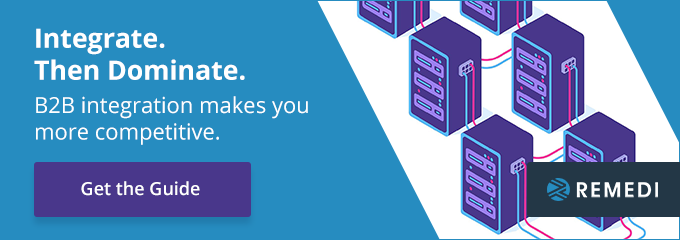
Over the past decade or so, companies have started paying attention to the customer experience…on the B2C side. Unfortunately, the same attention seems to be absent from B2B customers. B2B companies expect their customers to stick with them out of loyalty, not because they’re delivering greater value than their competitors.
Read on to learn how you can utilize B2B integration solutions to improve the customer experience for your customers. Are You Ready to integrate?
The Customer Experience: A Brief Primer
The customer experience is the impression your customers have of your brand as a whole throughout their purchasing journey.
Here’s why the customer experience matters: it strongly affects a customer’s willingness to stay with your company. McKinsey research shows that improving a customer experience so that it’s exceptional increases the likelihood that a customer will renew the service or buy another product by 30-50%.
B2B Customer Experiences
While B2B customers might have a great customer experience in their personal lives, they’re more likely to report that the customer experience is lackluster on the job. B2B companies have an average customer experience score of less than 50%, while B2C companies report scores of 65-85%.
Up to this point, B2B companies haven’t invested in the customer experience. They don’t see it as a differentiator. However, that doesn’t mean it’s too late to improve your B2B customer experience.

B2B Integration Solutions and a Better B2B Customer Experience
B2B integration solutions can help you deliver a better experience to your customers. Here’s how:
- By helping you proactively handle supply chain challenges
- By delivering the right order, every time
- By offering them flexibility in purchasing channels
Proactively Handle Supply Chain Challenges
When a supply chain challenge crops up (factory closures during COVID-19 are an excellent example), you can’t deliver goods on time to your customers.
B2B integration solutions help you overcome those challenges by providing real-time visibility into your supply chain. In addition, it can alert you to potential supply chain disruptions, so you can proactively manage those disruptions. For example, let’s say a supplier can’t make a shipment – with B2B integration solutions, you have advanced notice and can make other arrangements, so you can still meet customers’ needs.
Deliver the Right Order, Every Time
From your customer’s perspective, it’s a costly hassle when they don’t receive the correct order.
You can avoid incorrect order filling with B2B integration solutions. B2B integration solutions take order information directly from a system of record and transmit it to the warehouse so the shipment can be packed properly. As a result, you won’t make mistakes, and your customers have a better experience.
Offer Flexibility in Purchasing Channels
Today’s B2B customers are accustomed to purchasing goods and services online in their personal lives. B2B digital connectivity enables B2B e-commerce. In turn, B2B integration solutions enable B2B digital connectivity.
Offering excellent customer service in the B2B realm shouldn’t be a pipe dream. If you’re already using a B2B integration solution, a B2B integration consultant can help you drive value from your solution to create an excellent customer experience. Integrate. Then Dominate.




